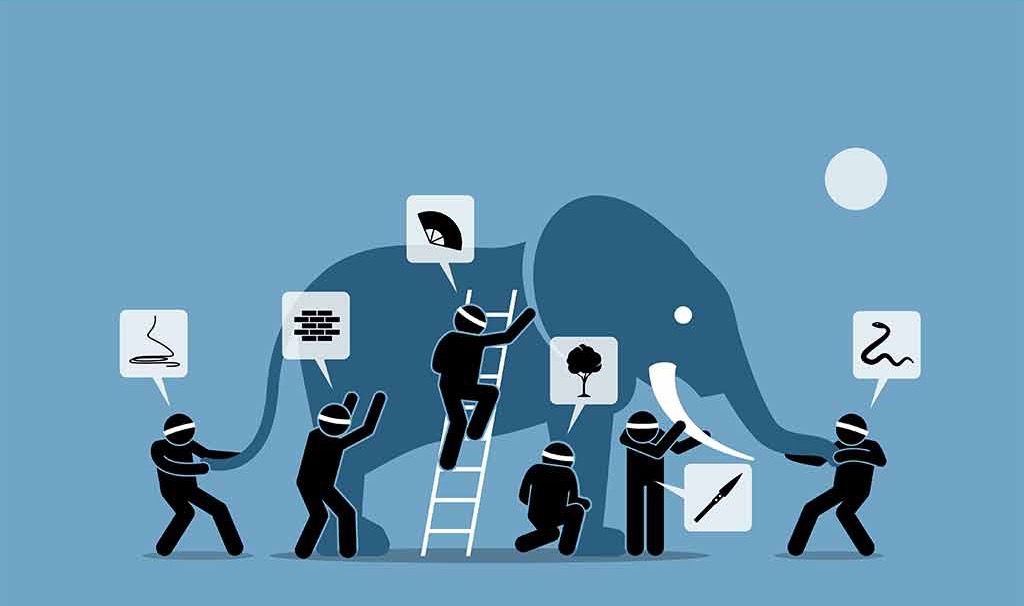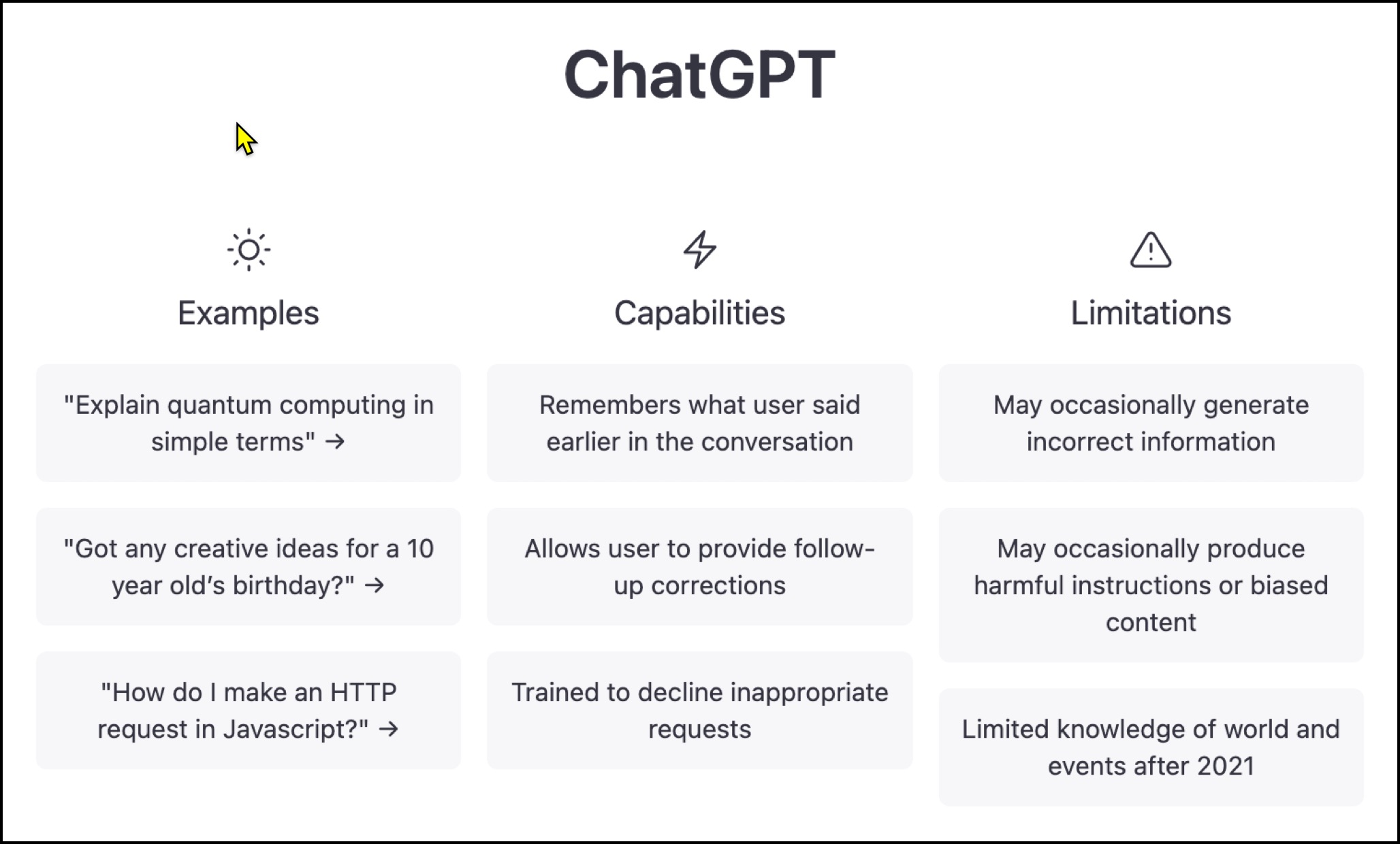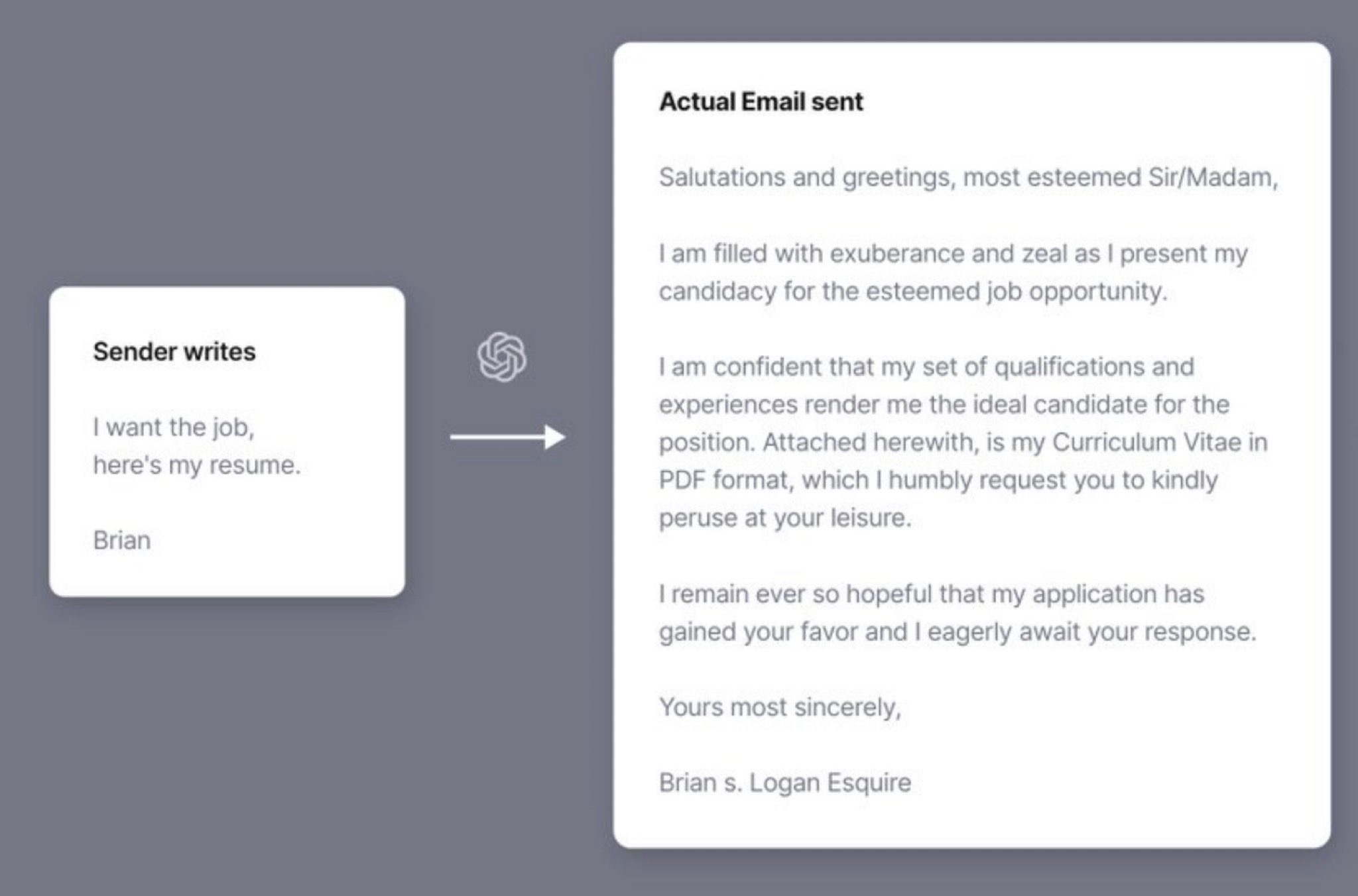
Remember the parable of the blind men and the elephant? Each person draws different conclusions about the elephant based on their limited experiences.
ChatGPT is the elephant in the room. There are wild disagreements raging online about every single aspect of ChatGPT. It’s such a big elephant that almost no one sees the entire thing.
In some versions of the parable, the blind men stop talking, start listening, and collaborate to “see” the full elephant. Do you think that will happen in 2023? If so, you’re wonderful, Forrest Gump, and you should never change. Keep running.
The rest of us who live in the real world should gear up for a lot of conflicting commentary and fuss and fury about ChatGPT. Let me give you some perspective to help you through the next few years.
ChatGPT seems like a big deal. Is the sky falling? Is the world about to change?
Did the world change when the internet arrived and humanity shared all of our knowledge and culture online? When Apple introduced the iPhone? When Google introduced Google Search? Yes. Yes it did. And yet, here we are.
The tech represented by ChatGPT is going to change the world too – and ten or twenty years from now we’ll still be here, flawed people making our way through our lives, but with some different tools than we have today.
It is true, though, that some specific areas will be disrupted. We’ll talk about those in the next article.
What is the number one question about ChatGPT?
The number one question is, what does “GPT” stand for?
“Generative Pre-trained Transformer.”
You totally would have guessed that, right?
What is ChatGPT?
It’s a website that you can chat with. Try it! Type something in – a question, a prompt, there aren’t many rules – and it will answer, probably in complete conversational sentences and a fair degree of accuracy.
Smart people at a company named OpenAI took more or less the entire Internet and fed it to a giant computer. Every part of humanity is on the internet today – our history, our creative output, our lives, our philosophy, our knowledge of science, our daily interactions, all of it is on pages with text and pictures. All of it can be viewed and copied and turned into a giant database.
OpenAI fed all those words to its giant computer and taught it to be smart about how to retrieve them. It is learning fast how to weigh the reliability of the information and choose what to incorporate into its own answers.
The big magic trick was teaching the giant computer about language – “natural language processing.” The computer learned spelling and grammar. It learned how we phrase answers to questions and how we write articles and how we tell stories.
That’s “GPT” in a nutshell. It can be used for a variety of things behind the scenes. The “Chat” part is drawing all the attention because ChatGPT is consumer facing, the first publicly available use of this natural language fluency that is easy for people to see and understand.
Chatbots have been under development for decades. Old-timers will remember Eliza, created all the way back in 1964, which would repeat back what you said phrased as a question in a way that mimicked a therapy session. In 2016 Microsoft briefly released a chatbot that was being trained by each conversation, and withdrew it immediately when trolls were able to train it to respond with racist and misogynist screeds. The chat boxes that come up on company websites to start the process of handling returns or doing customer support – those are simple chatbots.
When you ask ChatGPT for factual information, the answer to your question is available on thousands of websites. In the old days, a Google search would give you links to the websites with good answers. ChatGPT synthesizes information from all the websites, then makes choices and writes its version of the answer persuasively. Mostly it provides correct answers because taken as a whole the internet is more likely to have correct information about any given topic. Similarly, when you ask ChatGPT to write a story, it considers what it knows about story telling from reading thousands of other stories, then “creates” something that isn’t quite like something that already exists.
Then ChatGPT learns from feedback. Maybe people at OpenAI review its answers and tweak things, maybe people receiving the ChatGPT answer provide feedback – or immediately do another inquiry that allows ChatGPT to learn what they really wanted and try harder to provide it the next time.
The key is, ChatGPT is built on what we have put online. It’s not creating anything. But a computer that can manipulate the entire contents of the internet, then talk about it fluently – it will frequently seem like magic.
What about the problems with ChatGPT? Will it get better?
You’ve heard that ChatGPT can produce articles/essays/poetry/search results/programming code that is as good as or better than most people – certainly faster and probably with better grammar. You’ve probably also seen anecdotes suggesting that it’s not very smart after all.
Easy criticism dominates the news today. It makes for good anecdotes and clickbait headlines. And everything you’ve heard is true. ChatGPT sometimes has incorrect information. It writes bad songs. It makes programming errors. It can be caught for plagiarism when it does not rewrite material sufficiently. Some of its output looks like it was written by an obvious bullshit artist. (See the email sample above.)
So what you need to know is that it will improve, and it will improve very quickly.
Forget the details. Just know that ChatGPT is built on a foundation known as GPT 3.5, meaning there have already been several generations of whatever it is.
GPT 4 is already being tested and is expected in 2023. It’s a big step forward. If you focus on the deficiencies of ChatGPT in its present form, you’re missing the big picture. It will get better.
The combination of natural language processing and big data processing – what we’re calling AI – can only be done by huge companies with deep pockets. OpenAI has lined up a partnership with Microsoft to get an infusion of ten billion dollars.
OpenAI has grabbed everyone’s attention and created the impression that Google is lagging behind. That is incorrect. Google has better technology for natural language processing and of course has an index of the contents of the internet. In fact, ChatGPT is built on top of a core breakthrough by Google back in 2017.
Google, though, has missed this burst of publicity because it does not have a consumer-friendly chatbot. Google’s use of the same skills is built organically into other products, where it does not call attention to itself. When you use natural language to do a Google search, or use natural language to speak to Google Assistant or a Google home device, you’re using the same technology – and it works well.
So when Google reportedly declared a “Code Red!” about ChatGPT, it wasn’t about catching up on the technology side. It was a declaration that Google needs to address the publicity gap by releasing consumer-facing services that have the ChatGPT “WOW!” factor.
Google is not the only competitor for OpenAI. Chinese tech giant Baidu intends to launch its own AI-driven chatbot next month, according to recent reports. It is the primary search engine in China and has been working on natural language processing for years – again building on Google’s breakthough research. Other companies are gearing up to launch their own competitors.
What are some stumbling blocks ahead for ChatGPT? Who will be disrupted by the new AI technology?
Those are great questions! I’m so glad you asked. We’ll talk about those next time.



Reading your articles satisfies like eating a good meal! I am bothered by the how, generally speaking, most websites spin the news not to stir the intellect, but rather, our emotions.
You statement is correct. If you focus on ChatGPT definitives, you are missing the big picture.
What readers need is someone to distill these complex subjects into its very basics and lay out the facts in simple terms.
You have done all that. Few people are willing, able, or ready to do it.
Thank you.
Bruce. Thanks as always – and my head hurts! Hope follow up articles will provide some relief. 🙂
Very interesting article, Bruce! A lot of helpful info on something that sounds like it will be huge in the near future!
Thanks Bruce! This was really helpful!